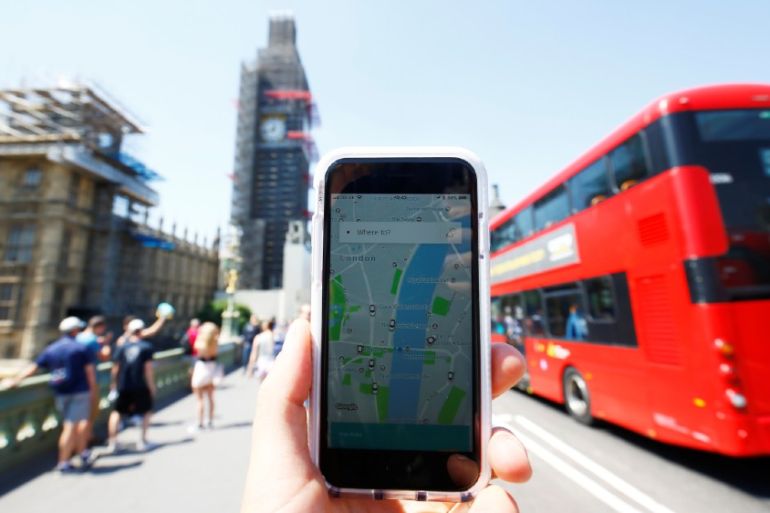Uber’s London charm offensive steps up with electric Nissan deal
The ride-hailing firm is driving changes to its fleet while appealing against a ban on operating in the UK capital.

Uber’s campaign to reverse its fortunes in the United Kingdom has stepped up a gear, with the Californian company announcing an agreement for Nissan to supply up to 2,000 electric cars to its drivers in London.
The ride-hailing app firm’s 45,000 drivers in the capital will be able to apply to use the Leaf vehicles.
Keep reading
list of 3 itemsUber appeals to regain London taxi licence
Bollywood star ‘shaken’ after Uber ride in London
The 40kWh cars will be manufactured at Nissan’s Sunderland factory and can travel up to 270 kilometres (168 miles) on a single charge. Nissan’s larger capacity model – a 62kWh version with a 385km (239-mile) range – is not being included in the programme.
Uber’s charm offensive in the face of a ban in the British capital has seen the company raise more than $105m through its Clean Air Plan designed to tackle air pollution since it launched a year ago. The plan includes adding a 15-pence ($0.2) fee surcharge to all London journeys.
Uber says the money is used to support the cost of drivers switching to electric vehicles.
|
|
“Our bold vision for London is for every driver on the Uber app to use an all-electric vehicle by 2025,” said Jamie Heywood, Uber’s general manager for northern and eastern Europe.
“The partnership with Nissan is a hugely significant step towards meeting this goal. The mayor of London has shown strong leadership on measures relating to air quality and we’re proud to support him in delivering his vision.”
Transport for London (TfL), whose board is chaired by Sadiq Khan, the mayor of London, rejected Uber’s application for a new London licence in November 2019 due to “several breaches that placed passengers and their safety at risk”. A study alleged huge numbers of unauthorised drivers – in more than 14,000 cases – had been operating fraudulently and without adequate insurance by impersonating registered drivers.
The firm is allowed to continue operating while it appeals against the decision, but its licence to operate in Birmingham is also due to expire shortly, and the firm will likely be under pressure to show it has taken criticisms on board and made amends for alleged rule-breaking and safety lapses.
“Through innovation and collaboration, companies like Nissan and Uber can tackle the challenges of advancing personal urban mobility, whilst also improving air quality in our major cities,” Andrew Humberstone, managing director of Nissan GB, said in a statement emailed to Al Jazeera.
There are only four petrol stations within central London’s “congestion charge” zone, while TfL has installed more than 1,000 electric vehicle charging points across the whole of the capital within the past year. According to TfL, there are 2.56 million cars registered in London.
“I want green transport to be the new normal, and with one battery electric vehicle sold every 15 minutes last year, we are heading in the right direction,” said UK Transport Secretary Grant Shapps.
“Electrifying taxi and private hire vehicle fleets is crucial to cleaning up our air and it’s fantastic to see this ambition matched by companies like Nissan and Uber as we drive towards a zero-emission future.”